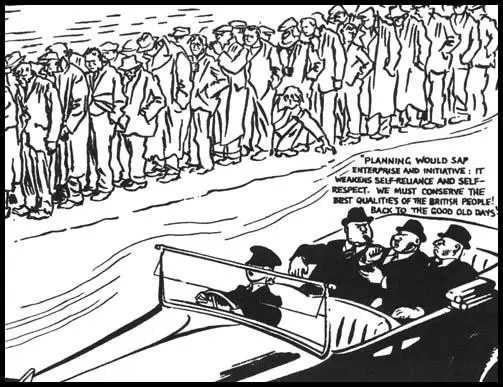1946 National Insurance Act
In the 1945 Labour Party manifesto they promised if they won the 1945 General Election they would bring in a Welfare State: "What will the Labour Party do? First, the whole of the national resources, in land, material and labour must be fully employed. Secondly, a high and constant purchasing power can be maintained through good wages, social services and insurance, and taxation which bears less heavily on the lower-income groups."

Winston Churchill, the leader of the Conservative Party, objected to this policy: "I must tell you that a socialist policy is abhorrent to British ideas on freedom. There is to be one State, to which all are to be obedient in every act of their lives. This State, once in power, will prescribe for everyone: where they are to work, what they are to work at, where they may go and what they may say, what views they are to hold, where their wives are to queue up for the State ration, and what education their children are to receive. A socialist state could not afford to suffer opposition - no socialist system can be established without a political police. They (the Labour government) would have to fall back on some form of Gestapo."
In 1946 the Clement Attlee and his Labour Government passed the revolutionary National Insurance Act that created the structure of the Welfare State. The legislation instituted a comprehensive state health service, effective from 5th July 1948. The Act provided for compulsory contributions for unemployment, sickness, maternity and widows' benefits and old age pensions from employers and employees, with the government funding the balance.
People in work, except married women, paid 4s 11d a week in National Insurance contributions. For the average worker, this amounted to nearly 5 per cent of their income. James Griffiths, the new Minister of National Insurance, claimed that it was "the best and cheapest insurance policy offered to the British people, of any people anywhere."
Primary Sources
(1) Labour Party Manifesto (1945)
What will the Labour Party do? First, the whole of the national resources, in land, material and labour must be fully employed. Secondly, a high and constant purchasing power can be maintained through good wages, social services and insurance, and taxation which bears less heavily on the lower-income groups.
(2) Winston Churchill, election broadcast (1945)
I must tell you that a socialist policy is abhorrent to British ideas on freedom. There is to be one State, to which all are to be obedient in every act of their lives. This State, once in power, will prescribe for everyone: where they are to work, what they are to work at, where they may go and what they may say, what views they are to hold, where their wives are to queue up for the State ration, and what education their children are to receive. A socialist state could not afford to suffer opposition - no socialist system can be established without a political police. They (the Labour government) would have to fall back on some form of Gestapo.
(3) Clement Attlee, As It Happened (1954)
It was clear that there could be no return to past conditions. The old pattern was worn out and it was for us to weave the new. We had not been elected to try to patch up an old system but to make something new. Our policy was not a reformed capitalism but progress towards a democratic socialism.
